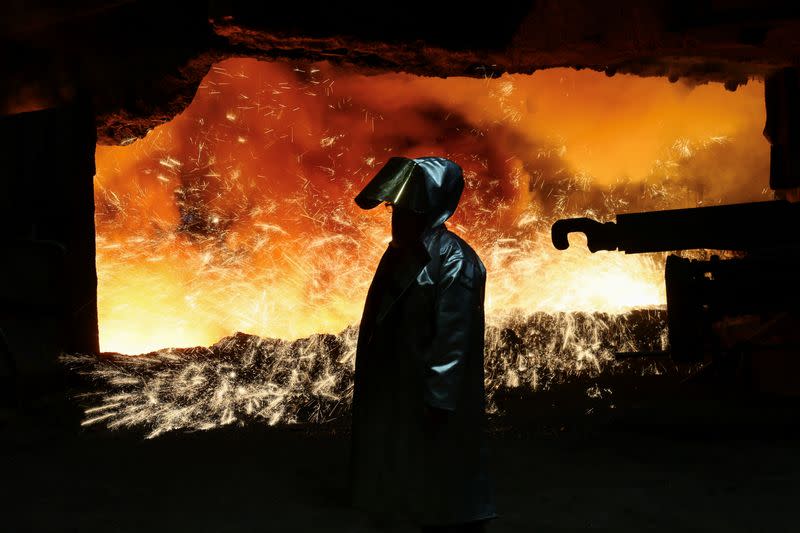Thyssenkrupp to reduce Duisburg steel production capacity and cut jobs

By Emma-Victoria Farr and Tom Käckenhoff
DUESSELDORF (Reuters) -Thyssenkrupp on Thursday fleshed out details of a restructuring programme for its challenged steel division, saying production capacity at its Duisburg site will be significantly reduced, with measures involving job cuts that cannot yet be quantified.
The steel division's executive board said production capacities would be reduced to approximately 9 million to 9.5 million tons per year, which roughly corresponds to the shipping level of the past three years. Today production capacity at the site is designed for around 11.5 million tons.
The announcement marks the most concrete step so far in the steel business revamp, which has become necessary in light of weakening demand and brutal competition from cheaper Asian rivals.
The streamlining measures would impact downstream processing as well as administration and service areas, the company said, adding that its goal is to continue to avoid redundancies for operational reasons.
Thyssenkrupp's steel business, whose roots extend back more than 200 years, carries significant relevance as a symbol of Germany's rise as an industrial power - a status that has somewhat waned in recent years.
The unit has so far been spared major restructuring moves, protected by powerful unions that have traditionally commanded great influence at the German conglomerate.
IG Metall, Germany's biggest union representing Thyssenkrupp workers, and the works council said the industrial group must guarantee jobs before reorganisation negotiations start.
Fears of a larger turnaround at the business were fuelled in February, when Thyssenkrupp Steel Europe's chairman Sigmar Gabriel, a former German economy minister, warned the business had to change fundamentally.
At the time, Gabriel said that while Thyssenkrupp Steel Europe could produce nearly 12 million metric tons of steel a year, it only sold around 9 million tons and maybe even less in the future. He also explicitly did not rule out job cuts.
Potential capacity cuts are also a sticking point in talks with EPH, the energy holding firm of Czech billionaire Daniel Kretinsky that Thyssenkrupp is trying to win as a co-owner of the steel division.
GOVERNMENT REACTION
Thyssenkrupp Steel Europe employs around 27,000 people, most of them at Europe's largest steel site in Duisburg, a city in the most populous German state of North Rhine-Westphalia (NRW).
The German government last year earmarked 2 billion euros ($2.13 billion) in subsidies for the industrial group to build a green steel plant in Duisburg.
A spokesperson for Germany's economy ministry said Thyssenkrupp's decision to reduce capacity with potential job cuts at the Duisburg plant is regrettable and pointed out that subsidies were aimed at keeping jobs in place.
"We are not spending billions for nothing," the spokesperson said at a government press conference, adding that steel production should be kept in Germany.
The ministry also reiterated its plea to the group to continue its course toward green steel production.
Thyssenkrupp confirmed its green transformation plans as well as the steel division's goal of climate-neutral production by 2045 at the latest.
($1 = 0.9384 euros)
(Reporting by Emma-Victoria Farr and Christoph Steitz in Frankfurt and Tom Kaeckenhoff in Duesseldorf, writing by Andrey Sychev, Editing by Matthew Lewis, Miranda Murray, Diane Craft and Susan Fenton)

 Yahoo Finance
Yahoo Finance 